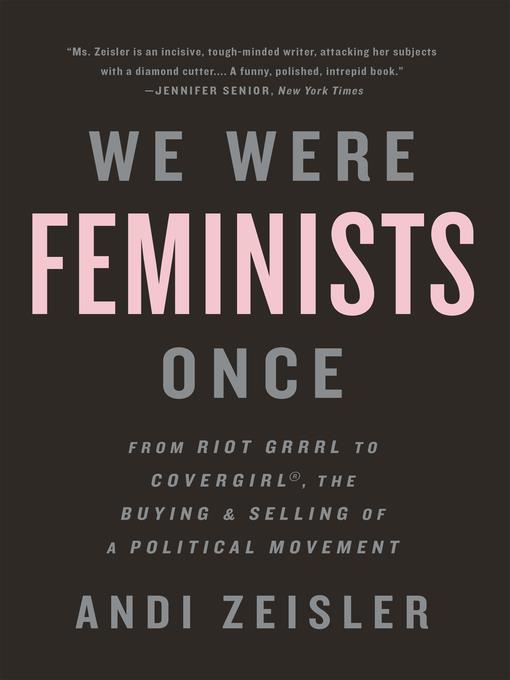
We Were Feminists Once
From Riot Grrrl to CoverGirl®, the Buying and Selling of a Political Movement
- اطلاعات
- نقد و بررسی
- دیدگاه کاربران
نقد و بررسی

February 29, 2016
Zeisler, cofounder and creative director of Bitch Media, explores the history of feminism in the media over decades of resurgence and backlash, with a critical eye toward its commercialization and sanitization. She explores the ways advertisers have marketed products to women, from second-wave-era
Virginia Slims cigarettes and Secret antiperspirant to contemporary “empowertising” that pays lip service to body positivity and posits that “any choice is a feminist choice.” Zeisler deems the 1970s “the golden era” of feminist television and celebrates the Norman Lear–produced programs that paved the way for Roseanne and Murphy Brown in the 1990s. She then eviscerates The Bachelor’s “interchangeable beauties... pledging instantaneous love for an equally vague mass of square jaws and biceps.” Zeisler also artfully blasts “postfeminists,” such as theorist Camille Paglia, who treat feminism like “an outdated personal accessory”;
the current culture of elite women’s conferences poisoned by corporate sponsorship; and the 1990s devolution of Riot Grrrl’s punk spirit into the fangless Spice Girls ethos. Other topics include the dearth of opportunities for women in
the film industry, the Bechdel test, and Spanx. Zeisler also takes on hollow celebrity feminist culture, in a chapter amusingly titled “Our Beyoncés, Ourselves.” Zeisler’s analysis of what she calls “marketplace feminism” is acute and endlessly relevant, highlighting the insidiousness of the coopting powers that be, and calling on feminists to direct their resources toward legitimate political action and reclaim feminism as an identity, not something commodifiable.

April 1, 2016
Bitch Media co-founder and creative director Zeisler (Feminism and Pop Culture, 2008) ruminates about how the current wave of feminism does not "challenge beliefs...so much as it offers nips and tucks." Fifteen years into the new century, feminism has come to occupy a complex, highly visible place in American popular culture. But according to the author, though the celebrity and consumer "embrace of feminism...positions it as a cool, fun, accessible...identity," the inequities that gave rise to the movement are alive and well. Celebrities like Beyonce and Katy Perry transform feminist sentiments about independence and self-respect into hit songs that make them millions while doing little to promote real change. And while women seem to be appearing more prominently in big-budget Hollywood films, in 2014, only 12 percent of all leading roles in the top 100 grossing movies were for females. Clothing brands like Spanx attempt to make a connection to female professional success with slogans like "Re-shape the way you get dressed so you can reshape the world!" Though apparently positive, advertisements such as these subtly play on women's insecurities by suggesting that the only thing standing between them and success is a properly controlled physical appearance. As Zeisler astutely argues, choice is really for women with the socioeconomic status that can support it rather than "the vast majority" stuck outside the halls of privilege. The author makes clear that no great strides have been made in changing the prevailing capitalist structures that suggest women's liberation--for those who can afford it--can come through consumerism. Despite her critiques, however, Zeisler makes it clear that however much it has been co-opted by capitalism, popular culture can still be a tool to promote feminist ideas to a mass audience. But until marketplace feminism can disentangle itself from surface marketplace glamour, it is still a work in process. Spirited, witty, and ferociously incisive.
COPYRIGHT(2016) Kirkus Reviews, ALL RIGHTS RESERVED.

March 1, 2016
Zeisler (cofounder & creative director, Bitch Media) explores feminism's current surge in pop culture popularity while questioning whether the increased visibility truly advances women's rights. The author first focuses on "marketplace feminism," a form of feminism that has been repackaged and rebranded so as to be easy to digest and nonthreatening to the status quo. With delightfully dry wit, Zeisler carries the discussion of the portrayal of women in advertising, movies, television, and fashion both in the present day and recent history. Additionally, she looks at current events and issues, highlighting areas in which marketplace feminism has glossed over women's rights issues thereby neutering the resulting conversation. Other topics analyzed include girls' education, the gendering of toys, the role of body image, and feminism as a political movement as well as the concepts of choice and empowerment. Ziegler argues that this type of feminism is detrimental to the movement, since it doesn't force society to confront the underlying structural topics that cause gender inequality. VERDICT This thought-provoking yet sobering consideration of the current state of feminism emphasizes the need to continue to fight for full equality. Highly recommended for readers with an interest in women's studies, pop culture, and the media. [See "Editors' Spring Picks," LJ 2/15/16, p. 28.]--Rebekah Kati, Durham, NC
Copyright 2016 Library Journal, LLC Used with permission.




دیدگاه کاربران